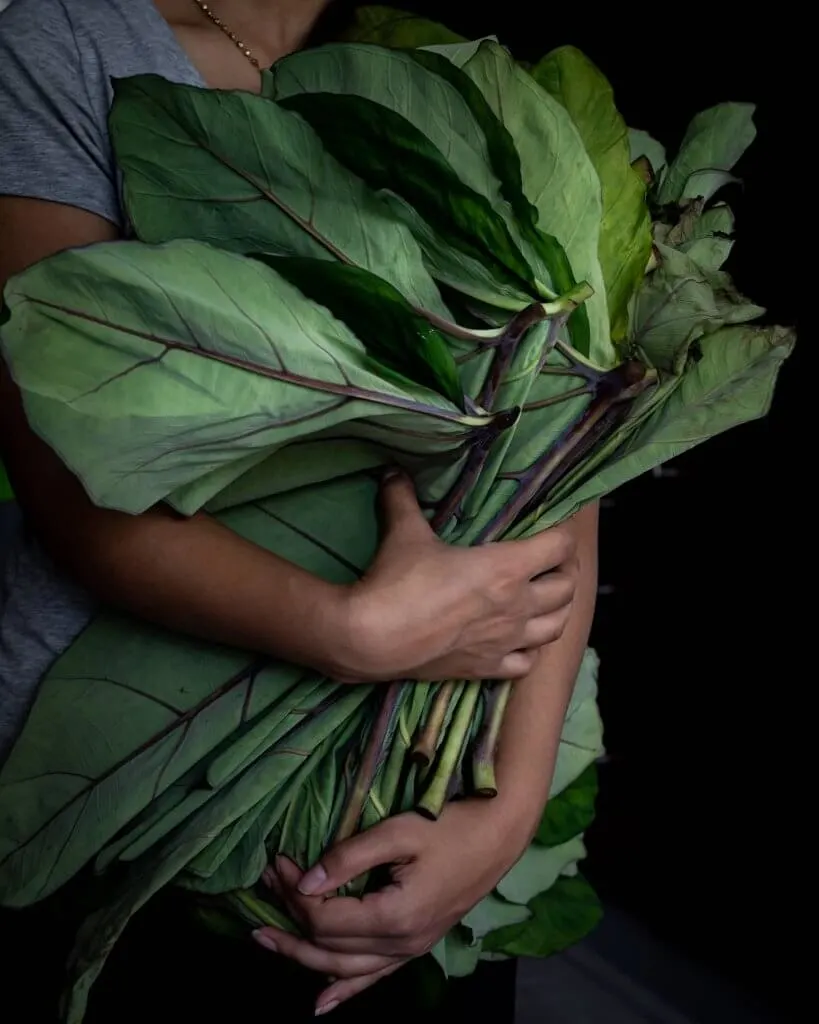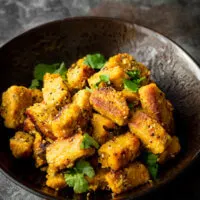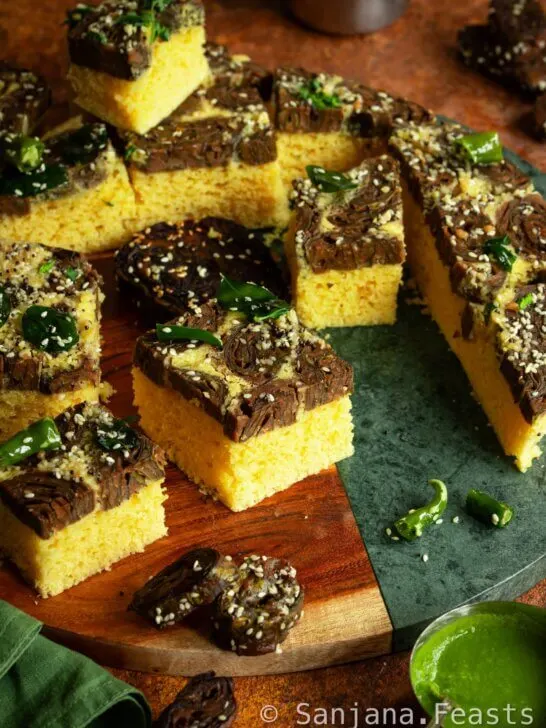Patra Dhokla are healthy Indian snack made by steaming Patra and Dhokla to create a double layer.
Try this delicious Gujarati recipe for breakfast, lunch, or afternoon snack.
If you’re looking for a fun and vibrant new snack to try at home, this 2-in-1 Patra Dhokla recipe is an innovative way to get your fix.

I’ll take you though my original recipe step by step, so you can recreate this spicy steamed cake.
What are Patra Dhokla?
A layer of tamarind-spiced colocasia rolls are baked into spongy dhokla (khaman) batter.
A tempering of spices goes on top and this snack is ready to slice and serve.
It’s a 2-in-1 way to enjoy the Gujarati snacks Patra and Dhokla.

Steam the batter and the bubbles in the dhokla batter create a light and spongy cake.
Douse in tadka, a tempering of spices to finish.
The final dish, Patra Dhokla is mouth watering!
One piece is never enough.
What are Patra?

Patra are colocasia leaves we spread, stack, roll, steam and fry.
Roll the leaves up tightly with sweet and sour tamarind paste and then simply steam, slice and pan fry with spices.
Here, you’ll find the most detailed guide to making homemade Patra.
If Patra isn’t a name you’re familiar with, you might know these steamed and fried colocasia rolls as one of the many other names it goes by:
Timpa, Alu Vadi, Pathrode, Saheena or Arvi ka Pathrode.
Which leaves are used for making Patra?


Colocasia leaves. These stately, dark green leaves are famous for their beautiful heart-shape and marble-like surface.
In Hindi, colocasia leaves are called arbi ke patte. In Gujarati, they’re patra na paan.
If you’re from Maharashtra and Goa, you’ll know them as patrodo, patrode in Karnataka and patrodu in Himachal Pradesh.
What are Dhokla?

Dhokla, or to be more precise in this case, Khaman are steamed savoury cakes made from gram flour, and spices.
Khaman (instant chickpea flour dhokla) is a soft and fluffy cake from Gujarat, western India.
This airy, sweet and sour cake is prepared with spices, curry leaves and chillies.
They’re an iconic Gujarati snack, enjoyed all over the world.
When making Dhokla (Khaman) batter, it is essential to entire process encourages aeration.
A long whipping time builds structure and proteins whilst it incorporates air into the mixture.
Finally, the batter is beaten vigorously with the catalyst (baking soda) which reacts with the citric acid to produce a bubbly, lava-like reaction.
Where can I buy ingredients for making Patra Dhokla?

You’ll be able to find all the ingredients for making Patra Dhokla at your local Indian supermarket.
If you cannot buy fresh colocasia leaves, you can always skip making your own patra, and buy a tin of ready-made patra, or frozen patra.
This is a great time saver and the results are still delicious.
Ingredients for making Patra Dhokla

- Gram flour (besan) – find gram flour in all large supermarkets or specialist Indian supermarkets.
- Ginger – freshly minced or grated ginger.
- Green chilli – long, thin Indian green chillies like jwala are best. Adjust the quantity to your taste.
- Curry leaves – fresh or frozen curry leaves for the tempering
- Mustard seeds – small black mustard seeds
- Sesame seeds – white sesame for the tempering
- Asafoetida – also known as hing. Omit for a gluten free recipe if yours contains wheat flour
- Citric acid – available in Indian food shops and online
- Salt – fine table salt
- Sugar – white granulated
- Oil – any, flavourless
- Patra – either shop bought or homemade
Step-by-step guide for making Patra Dhokla
1. Make the Patra or slice up shop-bought patra

If you’d like to make your own patra, try my Homemade Patra recipe here. To save time, you can also use shop-bought patra.
Ready made patra is available in Indian supermarkets, both in tins (cans), or in the frozen section. You will need to slice the canned type yourself.
Frozen will be pre sliced, simply defrost them and arrange as per the next step.
2. Arrange the patra in a cake tin
Grease and line a 30 cm (12 inch) round cake tin with baking parchment.
No need to line the sides. Simply cut a circle for the base of the tin.
Arrange the patra slices in a single layer on the base of the tin. Do not go up the sides of the tin.
3. Whisk together the dhokla batter

In a large bowl (three times the volume you need), mix together the warm water, salt, sugar and citric acid. Whisk well to dissolve.
Sift in the gram flour and whisk throughly, until totally smooth.
Cover and allow the batter to rest at room temperature for 20 minutes.
4. Set up the steamer
Place a metal trivet inside a large, deep pot with a tight-fitting lid.
Alternatively, use an idli steamer and trivet without the racks.
Fill the pot with around 450ml water, or as much as you can fill without the water touching the bottom of the cake tin.
Allow the water to boil. Leave the tin out of the steamer for the time being.
5. Activate the dhokla batter

Whisk the minced ginger and chillies into the batter.
In a separate small bowl, stir together the ingredients for activating the batter: gram flour, baking powder and baking soda.
Pour the oil on top of the batter.
Sprinkle the activating powder on top of the oil and then pour the water on top. It will begin to fizz.
Immediately whisk the batter vigorously for 30-40 seconds.
The mixture will triple in volume.
Keep beating until thoroughly mixed but do not beat so much that the batter deflates.

Quickly pour the dhokla batter over the patra and place the cake tin inside the preheated steamer, on top of the trivet.
Cover the pan with a tight-fitting lid and steam over a high heat for 25-30 minutes, or until a skewer inserted into the dhokla comes out clean.
Do not open the lid for at least 25 minutes.
6. Cool and turn the patra dhokla out

After around 30 minutes, remove the tin from the steamer and allow the patra dhokla to cool in the tin for 20 minutes.
Run a sharp knife around the edge of the tin and place a large plate or tray on top.
With one hand on the plate, flip the tin over to turn it out.
If the baking parchment is still on the patra, carefully peel it away.
7. Prepare the tadka (spice tempering) and drizzle it over the top

Heat the oil in a small saucepan. Add the mustard seeds (wait for them to finish popping), sesame seeds, curry leaves, sliced chillies and asafoetida.
Once the chilli has blistered slightly, switch the heat off.
Allow the oil to cool for a minute, then add the water and sugar.
Bring back to a simmer and stir until the sugar has dissolved.
Drizzle the tadka over the patra side and allow to stand for at least 20 minutes.
8. Slice and serve the patra dhokla

Use your sharpest knife to cut the patra dhokla into slices of your preferred size.
Serve with your favourite chutneys.
Patra Dhokla recipe | How to make Patra Dhokla | Delicious and healthy Gujarati snack
Patra Dhokla

A tasty 2-in-1 way to enjoy the Gujarati snacks Patra and Dhokla, together! A layer of tamarind-spiced colocasia rolls baked into spongy dhokla (khaman) batter. A tempering of spices goes on top and this snack is ready to slice and serve. Enjoy with your favourite chutneys for a light and flavoursome Indian snack at any time of day.
Ingredients
- 700g patra (homemade or shop bought), sliced into 1cm rounds
- Oil for greasing the tin
For the batter
- 250g besan (gram flour)
- 1 1/2 tsp citric acid
- 1 1/2 tsp salt
- 3 tbsp sugar
- 315ml warm water
For the batter activation powder
- 1 tsp besan
- 1 tsp baking soda (bicarbonate of soda)
- 1 tsp baking powder
- 50ml room temperature water
- 1 tbsp oil
For the tadka
- 2 tbsp oil
- 5-6 curry leaves
- 1 tsp mustard seeds
- 1 tsp sesame seeds (optional)
- 2 green chillies, slit or cut into big pieces
- 100ml room temperature water
- 1 tbsp sugar
- 1/4 tsp salt
- 1/4 tsp citric acid
- Coriander leaves, to garnish
Instructions
1. Grease and line a 30 cm (12 inch) round cake tin with baking parchment. No need to line the sides. Simply cut a circle for the base of the tin. Arrange the patra slices in a single layer on the base of the tin. Do not go up the sides of the tin.
2. In a large bowl (three times the volume you need), whisk together the warm water, salt, sugar and of citric acid. Keep whisking until everything has dissolved into the water. Sift in the gram flour and continue to whisk well, until totally smooth. Cover and allow the batter to rest at room temperature for 20 minutes, or up to an hour.
3. Place a metal trivet inside a large, deep pot with a tight-fitting lid. Alternatively, use an idli steamer and trivet without the racks. Fill the pot with around 450ml water, or as much as you can fill without the water touching the bottom of the cake tin. Allow the water to boil. Leave the tin out of the steamer for the time being.
4. Whisk the minced ginger and chillies into the batter. In a separate small bowl, stir together the ingredients for activating the batter, except the water and oil.
5. Pour the oil on top of the batter. Sprinkle the activation powder on top of the oil and then pour the water on top. It will begin to fizz. Immediately whisk the batter vigorously for 30-40 seconds. The mixture will triple in volume. Keep beating until thoroughly mixed but do not beat so much that the batter deflates.
6. Quickly pour the dhokla batter over the patra and place the cake tin inside the preheated steamer, on top of the trivet. Cover the pan with a tight-fitting lid and steam over a high heat for 25-30 minutes, or until a skewer inserted into the dhokla comes out clean. Do not open the lid for at least 25 minutes.
7. After around 30 minutes, remove the tin from the steamer and allow the patra dhokla to cool in the tin for 20 minutes.
8. Run a sharp knife around the edge of the tin and place a large plate or tray on top. With one hand on the plate, flip the tin over to turn it out. If the baking parchment is still on the patra, carefully peel it away.
9. Heat the oil in a small saucepan. Add the mustard seeds (wait for them to finish popping), sesame seeds, curry leaves, sliced chillies and asafoetida. Once the chilli has blistered slightly, switch the heat off. Allow the oil to cool for a minute, then add the water and sugar. Bring back to a simmer and stir until the sugar has dissolved.
10. Drizzle the tadka over the patra side and allow to stand for at least 20 minutes.
11. Use your sharpest knife to cut the patra dhokla into slices of your preferred size. Serve with your favourite chutneys.
Notes
- Patra Dhokla freeze very well. Pack into airtight, freezer-safe containers and freeze for up to 3 months. Defrost at room temperature.
- Patra Dhokla will keep in the refrigerator for up to 3 days. Place inside an airtight container once cool.
Nutrition Information:
Yield: 8 Serving Size: 1Amount Per Serving: Calories: 196Total Fat: 8gSaturated Fat: 1gTrans Fat: 0gUnsaturated Fat: 6gCholesterol: 0mgSodium: 750mgCarbohydrates: 25gFiber: 4gSugar: 10gProtein: 7g
Pin this recipe for later!

More recipes you might like





With love and Patra Dhokla,
Sanjana


Vicky
Wednesday 10th of January 2024
I made this today and it's so delicious! I just used canned patra for ease. I didn't get it as thick and fluffy as I'd like but I tried to scale it down to a 20cm tin and I don't think I did the maths right so actually I think I just didn't have enough batter. Anyway it was very very tasty and I'll definitely make again.
Healthy Patra Dhokla Recipe – Recipes of India
Wednesday 30th of August 2023
[…] Visit Direct Link […]
Deep Patel
Saturday 15th of July 2023
Hi, good recipe. However, Dhokla and Khaman can NEVER be used interchangeably. You know this is Khaman as you have mentioned in multiple times. You should have used ‘Patra Khaman’ as the name. Cheers!